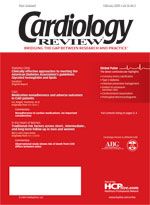Publication
Article
Cardiology Review® Online
Depression and coronary artery disease in women
Author(s):
Mallik and Vaccarino remind us that heart disease kills more women than the next 7 causes of death combined.
Mallik and Vaccarino remind us that heart disease kills more women than the next 7 causes of death combined. They also note that although the incidence of coronary artery disease (CAD) in men is declining, the number of cases has increased for women, and women have a poorer outcome after coronary artery bypass graft (CABG) surgery than do men. Using a standardized assessment of functional status postoperatively, Mallik and Vaccarino examined the effect of depression on both men and women with heart disease and found important differences. Why is this so?
To begin with, the public sees heart disease as a particularly male disease. Television and motion pictures have imprinted the image of a man clutching his chest as he suffers a heart attack. A woman suffering from heart disease is not something one ever sees. For this reason (and others), women are less in tune with the danger that may be lurking within. Because the symptoms and diagnostic tests for CAD are often different in men and women, wom­en are often misdiagnosed. Their proper diagnosis frequently occurs later in the disease state, which brings us to treatment and to surgery, in particular.
CABG surgery is suggested less often to women, and women undergoing surgery have less favorable outcomes. Mallik and Vaccarino suggest that depression diagnosed before cardiac surgery is a stronger risk factor for predicting the functional outcome in women than in men. Whether this difference in depression rates persists postoperatively is unclear,1 but the literature generally shows a higher incidence of depression diagnosed in women than in men.
Many issues may be responsible for this statistic. First, women are more comfortable talking about their emotions to physicians. Men often self-medicate with alcohol or drugs instead of going for therapy. Second, women are often responsible for the well-being of children and parents. When they are incapacitated, they are unable to perform their expected caregiving roles in the family. That alone may contribute to making them depressed. Third, women are greatly affected by the quality and number of meaningful emotional relationships, especially when they become older. When they are alone, isolated, or ill women often feel depressed. More depression equals less adherence to cardiac medications, which perpetuates the problem.2
Based on this and other studies, it is therefore important to understand and treat depression before cardiac surgery, with the hope of acheiving a better postoperative outcome. Wom­­en recovering from cardiac surgery need adequate care in the home to help them function. Transpor­tation must also be provided so that women can attend rehabilitation and support groups so they are not isolated and alone.






